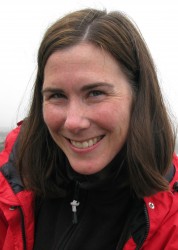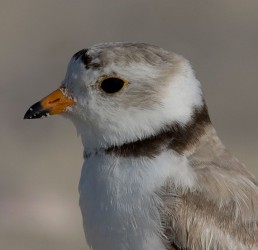Reflecting on engaged scholarship: Out of the frying pan…
Today, COMPASS published a commentary in PLOS Biology on the journey from science outreach to meaningful engagement. This post is part of a series of reactions, reflections, and personal experiences we hope will expand the conversation. Read the summary post here, or track the conversation by searching for #reachingoutsci
 I often think of my life as a series of connected circles. I grew up in Plymouth, Massachusetts, a bit more than an hour from where I now live and teach. My children love to play in the sand and swim at the beach, just as I did, 30 years ago.
I often think of my life as a series of connected circles. I grew up in Plymouth, Massachusetts, a bit more than an hour from where I now live and teach. My children love to play in the sand and swim at the beach, just as I did, 30 years ago.
The circle I think about most spans research, teaching and practice. My students and I investigate how people are connected to coastal ecosystems, in New England as well as Mexico’s Gulf of California. We are bringing together knowledge and approaches from diverse fields, from anthropology and ecology to economics and oceanography, in order to understand the drivers of coastal ecosystem change and how we humans can be positive forces in the marine systems of which we are a part. When we can, we share what we are learning with community members, resource managers, and other decision-makers, in order to help develop more effective conservation and ocean management strategies.
For two summers during college, I studied the breeding habits of Plymouth’s beach birds, including the federally listed piping plover. As time went on, I added interpretative programs for beachgoers, and also dug more deeply into coastal policy and management. The culmination was a report I wrote in late summer 1994, summarizing the birds’ success on Plymouth Beach and also describing how beach management was aligned, or not, with state environmental laws.
Before I went back to school, I delivered a copy of the report to the town hall, as requested by my supervisor. The town had negotiated a compromise with the state that allowed continued access to the beach by SUVs. That violated the spirit if not the actual language of the law, at least in my 20-year-old idealistic field biologist’s view.
The beach and birds have managed to inflame Plymouth politicians’ passions many times, and my report was no exception. The town’s elected leaders, the Board of Selectmen, demanded I return to town to defend the report, after berating the birds, my report, and me in a public meeting. I chose not to return home, nor even to publicly comment on the matter, citing the priority of my ‘academic work.’
 Would I do the same now? I probably would word the report more carefully and perhaps defend my analysis in person. Fortunately, I have had many opportunities since that summer to share my science and contribute to the public discourse. It’s always challenging, never quite comfortable, but yet the right thing for me to do. It is important to me to connect the knowledge I’m generating and teaching my students with the challenges people are wrestling with ‘in the real world.’
Would I do the same now? I probably would word the report more carefully and perhaps defend my analysis in person. Fortunately, I have had many opportunities since that summer to share my science and contribute to the public discourse. It’s always challenging, never quite comfortable, but yet the right thing for me to do. It is important to me to connect the knowledge I’m generating and teaching my students with the challenges people are wrestling with ‘in the real world.’
If the report I filed in August 1994 in Plymouth was the spark, then my July 2009 presentation to senior staff writing the National Ocean Policy was the real fire, 15 years later. I had 48 hours’ notice to prepare a presentation on the science and practice of ecosystem-based management. I was at a national meeting in Boston and had to travel directly to Washington, DC, in order to make the already scheduled meeting. Yet I had been preparing for this opportunity for a long time. I had spent the last four years writing the first book on the topic, and initiating a research program in four different countries on how the theory developed by academic scientists was or was not translating ‘in the water.’
The taxi dropped me at a side door of the NOAA DC headquarters, and I was ushered through security to wait outside a door where more than 30 senior staff from every cabinet level office plus others were convened. I’d given presentations on my science to resource managers, politicians, and members of the public many times in the 15 years since my ill fated coming out in Plymouth, but never to a group like this. I didn’t know what to expect.
This time, I was pleasantly surprised. Staff from the Department of Transportation seemed just as interested in what I had to say as those from EPA and Interior. The mood was intense, yet positive. I tag-teamed with one from one of NOAA’s chief scientists, who joined us remotely. The group peppered us with questions for close to an hour. Leaving the building less than two hours after I had entered, I was invigorated by the probing questions, and encouraged by the group’s clear commitment to proactive ocean stewardship.
Exchanges like these enable me to better understand decision-makers’ perspectives. The constraints and opportunities of crafting federal laws or local management rules are unique to a particular place and time and the more I can understand those, the more helpful I can be, as a citizen and a scientist.
I could have never imagined where my time as a beach loving field biologist would lead me, or that I now would be inspiring other college students to share their science. It is an iterative endeavor with many potential returns for science and society. With each round, I am encouraged and challenged to do better.
Heather Leslie is a marine conservation scientist and Libra Associate Professor at University of Maine. When she wrote this post, she was an assistant professor at Brown University and living in Providence, Rhode Island with her husband and two young children.
